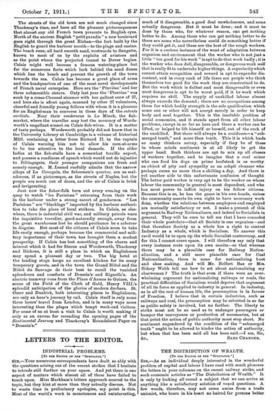LETTERS TO THE EDITOR.
INDUSTRIAL PROBLEMS.
[To ma Eaxms OF TES "SPECT1TOF:] 81n,—Your numerous correspondents have dealt so ably with the questions arising out of the recent strikes that I hesitate to intrude still further on your space. And yet there is one aspect of matters which almost all of them have failed to touch upon. Miss Markham's letters approach nearest to the topic, but they hint at more than they actually discuss. Not to waste time in preliminary apologies, my point is this. Most of the world's work is monotonous and uninteresting, much of it disagreeable, a good deal unwholesome, and some actually dangerous. But it must be done ; and it must be done by those who, for whatever reason, can get nothing better to do. Among those who can get nothing better to do there are some who nevertheless could do something better if they could get it, and these are the best of the rough workers. For it is a curious instance of the want of adaptation between organism and environment that the worker who is not just a little " too good for his work " is apt to do that work badly ; it is the worker who does dull, disagreeable, or dangerous work well that is really fit to undertake higher things. A superiority which cannot attain recognition and reward is apt to engender dis- content, and in every rank of life there are people who think themselves too good for the work they are constrained to do. But the work which is dullest and most disagreeable or even most dangerous is apt to be worst paid, if it be work which requires no skill. The supply of unskilled labour almost always exceeds the demand ; there are no occupations among those for which bodily strength is the sole qualification which some one or other will not accept merely in order to keep body and soul together. This is the insoluble problem of social economics, and it stands apart from all other laboar problems, except in so far as here and there a worker can be lifted, or helped to lift himself or herself, out of the ruck of the unskilled. But there will always be a residuum—a "sub- merged tenth," and more than tenth. This it is which leads so many thinkers astray, especially if they be of those in whose minds sentiment is at all likely to get the upper hand. Such thinkers are apt to mix up all classes of workers together, and to imagine that a coal miner who can feed his dogs on prime beefsteak is as worthy an object of pity and sympathy as an ashpit cleanser who perhaps earns no more than a shilling a day. And there is yet another side to this unfortunate confusion of thought The better paid worker is very apt to be the worker on whose labour the community in general is most dependent, and who has most power to inflict injury on his fellow citizens. Because this is so, he has the game in his own hands, unless the community asserts its own right to have necessary work done, whether the relations between employers and employed are mutually satisfactory or not. I make a present of this argument to Railway Nationalizers, and indeed to Socialists in general. They will be sure to tell me that I have conceded their whole postulate—that all Society is one organism—and that therefore Society as a whole has a right to control Industry as a whole, which is Socialism. To answer this cavil would be to open up the whole Socialist controversy, and for this I cannot crave space. I will therefore say only that every instance rests upon its own merits—so that whereas there may be a. plausible case for Railway Nation- alization, and a still more plausible case for Coal Nationalization, there is none for nationalizing boot and shoe making. And will Mr. Belfort Bar or Mrs. Sidney Webb tell me how to set about nationalizing my charwoman ? The truth is that even if there were an over- whelming argument for nationalizing railways or coals, the practical difficulties of Socialism would deprive that argument of all its force as applied to industry in general. In industry, as in all the rest of human life, the presumption is in favour of Freedom. I believe that in certain industries, such as railways and coal, the presumption may be rebutted in so far as public safety is involved, but no farther. The liberty to strike must not be so used as to endanger passengers or hamper the conveyance or production of necessaries, but at that point the action of publio authority must stop short. No sentiment engendered by the condition of the " submerged tenth" ought to be allowed to hinder the action of authority, but when that has been said all has been said.—I am, Sir,






























































 Previous page
Previous page